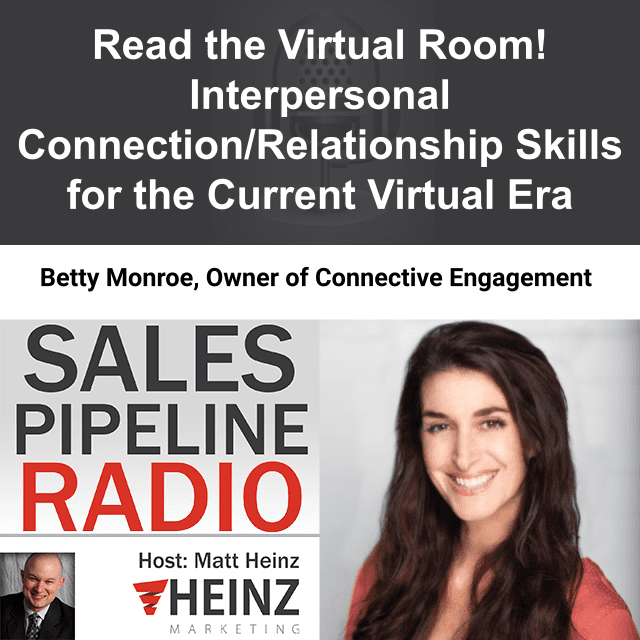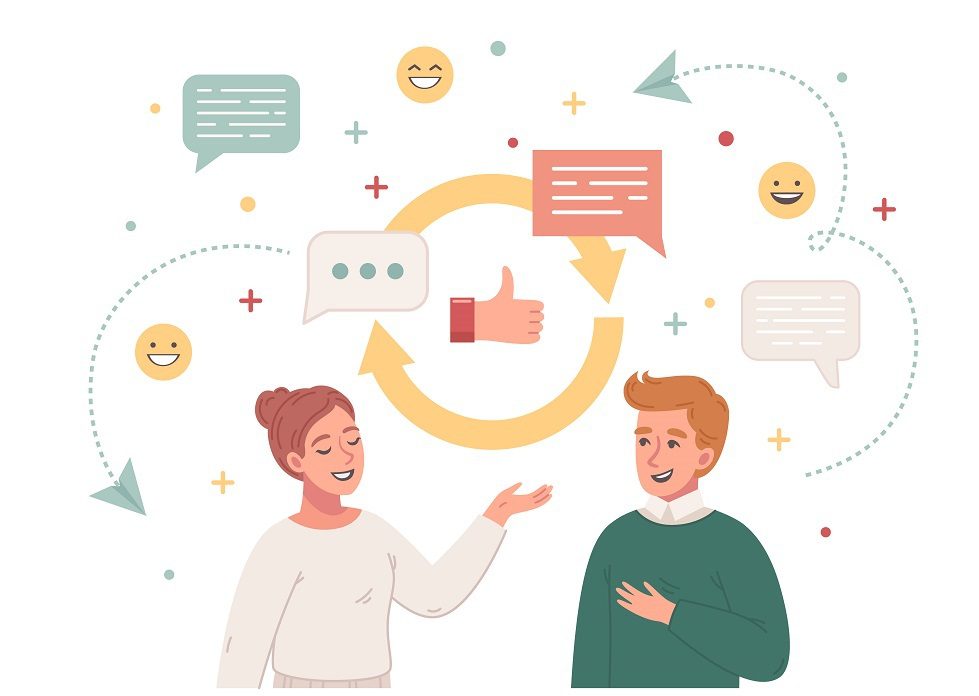Sales Pipeline Radio, Episode 319: Q & A with Betty Monroe

By Matt Heinz, President of Heinz Marketing
If you’re not already subscribed to Sales Pipeline Radio, or listening live every Thursday at 11:30 a.m Pacific on LinkedIn (also on demand) you can find the transcription and recording here on the blog every Monday morning. The show is less than 30 minutes, fast-paced and full of actionable advice, best practices and more for B2B sales & marketing professionals.
We cover a wide range of topics, with a focus on sales development and inside sales priorities. You can subscribe right at Sales Pipeline Radio and/or listen to full recordings of past shows everywhere you listen to podcasts! Spotify, iTunes, Blubrry, Google Play, iHeartRADIO, Stitcher and now on Amazon music. You can even ask Siri, Alexa and Google!
This week’s show is entitled, “Read the Virtual Room! Interpersonal Connection/Relationship Skills for the Current Virtual Era“ and my guest is Betty Monroe, Owner at Connective Engagement.
Tune in to hear more about working the virtual room and learn how to:
- Rebuild rapport
- Develop interpersonal skills in a virtual environment
- Be comfortable presenting your authentic self
- Build genuine relationships with coworkers and clients
Listen in now for this and MORE, watch the video or read the transcript below:
Matt: Welcome everyone to another episode of Sales Pipeline Radio. My name is Matt Heinz. Excited to be here with you on the first Thursday in June. Here in Seattle, it is really working hard to try to just be spring. We are not even worried about summer yet; we just want spring to come here in Seattle, so we are working on it. If you are watching this live, if you are participating live on LinkedIn or YouTube, thanks very much for joining us. If you are on LinkedIn, you can be part of the show. If you are watching this live and have a question for our guests today, a comment or opinion on our topic today of working the virtual room and virtual relationship building and interpersonal skills in a virtual environment. We would love to have you chime in, ask questions, make comments. If you are watching or listening to this on demand, thank you so much for subscribing and downloading. Every episode of Sales Pipeline Radio you can find available on demand at salespipelineradio.com. Each week we are featuring some of the best and brightest minds in B2B sales and marketing. Very excited today to have with us Betty Monroe, she is an engagement coach and a sales consultant with Connective Engagement. Betty, thanks so much for joining us today.
Betty: Thank you for having me so much and let us clarify, I am not the marriage type engagement coach. That is actually, been a question asked.
Matt: So not marriage engagement but I think connectivity amongst us in a more virtual world is… We are both doing this from versions of our home and doing more online and interactive engagements like this versus time in person. That was a pivot for COVID that many cases that balance will continue. So, we are all having to learn a different way of engaging with each other. So, talk a little bit about how that came to you, how that is something that you are so passionate about and where your focus is there.
Betty: Well, I mean, to be as brief as I can, after 23 years as an elementary school educator, an early childhood professional, an actress and a teacher of children in the arts, it serves as a really great background for me to see and understand how people connect and understand not only each other but themselves. And over the last few years, having been a podcast producer and marketing manager for a sales-based podcast, I really watched B2B sellers and other professionals struggling with this environment.
I happened to be a working film and TV actress as well and I started kind of wheels spinning thinking, my gosh, I was seeing people like this on camera which was certainly not helpful to anybody. I am sure many of us could raise our hands and say, “Yeah, I’ve seen that or worse.” And I really started thinking, my gosh, I would love to help people with not only the aesthetics of the virtual and now hybrid space, but the interpersonal skills that seem to have been lost or muted, not just due to the pandemic but due to too much of this. So that’s kind of how I wound up where I am.
Matt: It was a fascinating background. I think your experience as an actress has certainly, sort of provides some skills and experience to this and to a certain extent, how much of when we’re interacting with people in a business environment, how much of that is or should be acting versus how much are do we need to be natural? And so how do people think about the kind of proactively, the kind of presence or persona they want to have in front of others from a business perspective?
Betty: I am so glad you asked that, Matt. You should not be acting at all. Even as actors, we do not want to be acting. We want to be human beings being human. We are being versions of ourselves as the characters we play as another human or something that should be portrayed as human. So as sellers and actors, we have a lot in common in that we base almost everything we do on the relationships that we build and the trust that we create within building those relationships, and the space that we do that in has changed. So, people are struggling and the biggest complaint that I hear from sellers and other professionals even attorneys and doctors is, “Gosh, how on earth do I connect to a person in a box next to me on a screen as opposed to having them sitting across from me at a table?” So, I do not want you guys to be acting at all and it’s about being your most authentic self and the ability to build that genuine relationship.
Matt: And it is harder virtually just because the environment we are in. I mean, as we record this session, I am looking at you, but you do not think I am looking at you because I should be looking up there. Even just watching a sporting event last night, watching an interview from some people that were supposed to be staring at cameras and they were literally, sitting 10 feet away from each other but they were looking like they were looking at each other that is unnatural to do. So how do you train yourself or how do you get comfortable being your authentic self and being natural while still looking like you are paying attention and engaged in the conversation?
Betty: it is just some getting used to and it is everybody… Change is difficult to not resist, correct? So, I am looking directly at you right now but if I look at the camera to me that feels unnatural, I want to look at you. And I think that once everybody becomes used to the fact that, “Yeah, we may not be appearing to look directly at each other, I am looking directly at you at this moment.” So, it is simply about pretending that is not there, the barrier is not there. And I am just looking at you, listening to you, watching your body language, and listening to you most importantly. People are so wrapped up in the needing everything to be perfect and it is really not necessary, nothing is perfect. And a perfect example I like to share is, I am sure there are multiple people who have had a toddler run, screaming naked behind them right on camera while they are in the middle of a Zoom meeting with their CEO or higher ups, or goodness knows. And it is funny, but it is real life. And I think once we come to accept that nothing is perfect, especially, given the state of our world at this time. We are all going to be okay if we let go of that need for perfection because it is not going to happen.
Matt: Speaking today on Sales Pipeline Radio with Betty Monroe, she spends a lot of time helping sales and marketing teams just increase connection, increase genuine interactions to just help with business discourse today. And I really like your perspective on having to look at the camera versus looking at you. And honestly, I think given that we look at ourselves and look at screens all day long, there must be some signs behind the fact that if I could look at you, but you are not looking directly at me, it’s less intense. And therefore, it is a little more natural and it makes it so that you are more focused on the conversation you want to have. Is there anything behind that?
Betty: I actually, do not know the answer to that. However, my guess would be this, you are right in the sense that for you that works and for me, maybe, so. Every individual is different and the comfort level of everyone is going to be at a different space. So, I am comfortable either way because that is my personality but yes, a lot of people who are utilizing this virtual space now that are the most uncomfortable are perhaps, IT professionals or people that are more introversive and aren’t as used to being social or type A, or the leader in the physical space. So, for those people, it may be more comfortable to not have to look directly into somebody’s eyes across the table. Make sense?
Matt: It does for sure. I mean, let us take that to another level. I think the white space around business meetings is different now than it used to be. If you are in an office with your colleagues, like there was the time before meetings and after meetings, there was the waiting outside the conference room door when someone else’s meeting was happening. If you are doing a sales call, there was the right up the elevator before and after the meeting where you had that natural opportunity for small talk. Zoom does not naturally have that and so how do you really rebuild rapport building and so create opportunities to naturally authentically connect with people when the space, the time and in some cases, the senses are limited in this kind of a capacity?
Betty: Well, that is definitely, a multifaceted question but I think easily answered in several stages. So, the first part, getting back that water cooler time or the white space you are referring to is easier than you think. Now, we are used to this, we know we are scheduling these meetings and you need to let everybody know, the first five minutes is going to be dedicated to just chatting and not just, how is the weather? Let us get back to actually, connecting to each other. Start your meetings with asking your meeting participants, “Hey, tell me one sweet thing and one sour thing that’s going on in your world right now.” It can be regarding work or personal life, whatever you are comfortable sharing and showing your level of vulnerability. And that is another thing, and we can circle to having the sense of empathy and vulnerability, both in roles of leadership and as colleagues is so integral. That has been lost and people got so tied up in all the craziness going on in the world or that need to be perfect and how do we switch from in person to this virtual space and I do not like it. And we need to let it all go and just be human beings being human. I cannot repeat that enough times. That is one of my favorite things to say because people have forgotten how to do that.
Matt: Yes. Well, I think that because we have these narrower connections in a virtual format and I think because people then do not naturally have, in some cases, the professional backdrop they used to be able to have. I used to do most events like this from my office where there is a much better background than if you are watching this and seeing the hot mess behind me in the basement here. But do you know what? We all have our hot mess; we all have the natural lives that we live. And I think if that is who you are, not that everyone is a hot mess but just we are all human as we go through this professionally and personally.
And being willing to mix the human with the professional, it feels like there is a place for that deep in business, in sales, in management. What would you say to someone who is still just anxious about how that makes them appear whether it is someone who is in an interview trying to get a job or early in their career, trying to impress a management team? There is a lot of anxiety I see from people that do not have some of those natural appearances so to speak that are doing the best they can from where they are. How do you help them ease into being human?
Betty: I think just reminding them that they are not alone, reminding them that they are not only one in that situation. You claim your background’s a hot mess, it is actually not. I see two pieces of neat furniture with things neatly arranged on top and that is okay. Personally, when I am working with someone on the virtual aesthetics of their meeting space whether it is in an office or at home, I am not a fan… And again, this is my personal opinion, everyone has one. I am not a fan of the virtual backgrounds, and I will tell you why, and there’s nothing wrong with them but I want you to be the main focus of what I’m looking at. And right now, you are just because you have furniture behind you, does not take away from you because you are lit properly, you are elevated to a proper level where I can actually, see as much of Matt as I need to see to communicate with you.
And I think people need to get off of worrying about that need for perfection. Yes, you do not want to show up with a hoarder’s basement behind you but you definitely, want to make sure that everybody… First of all, everyone understands that they are not alone in this, everyone is going to have a different space to work in. If you live in a two-bedroom apartment in the middle of Manhattan and you no longer have an office to go to, you do not really have much choice, so it is okay to be okay with being imperfect.
Matt: Well, I will take it a step further. I agree with you on the background piece, and we do some recurring events where we have a common background that becomes a branded thing. But sometimes if people show up with what is clearly a fake background, I am always wondering, “Well, what are they hiding?” I am distracted looking at that. Now, I am not focused, I am distracted because I am like, “That clearly is fake, what’s what are they hiding?” Is there a difference to, if you are a manager and you are trying to help someone be comfortable and authentic, how do I, as a manager help who I am talking to feel comfortable and not as anxious or self-conscious of what is behind them or how they are showing up virtually?
Betty: I love that you asked that. One of the things I really like talking to organization leaders and managers about is the fact that you cannot meet these prospects or potential talent that you are thinking of adding to your teams the way you used to, and we are meeting them virtually. And one of the pros that this environment has created is that it enables you to expand your ability to reach for those people. So, it is okay for you to in, say an email prior to meeting them when you are setting up the time to meet with them, share a fun or unique fact about yourself at the end of that email. Share something that maybe not a lot of people know that you are comfortable sharing that is appropriate but yet shows that you have a sense of vulnerability and empathy. And it is going to break that ice just enough for them to hopefully respond with the same. Ask them to share one about themselves too, show that human side of you. There is a huge difference between a leader and a boss and that comes everywhere. And one of the things I really pride myself in when I am imparting coaching skills to my clients is that we have to remember that those soft skills that used to be not so important in the corporate environment are actually, more so because of exactly what you just said. So, recognizing that it is okay to be a human being, being human again, and to show some level of not only vulnerability in yourself but empathy towards others is going to really soften that blow and hopefully make them relax.
Matt: Well, and there are a lot of tangible ways you can do that. I mean, if you have a meeting for a half hour, plan an agenda for 20-25 minutes and plan on not giving people a couple minutes back but saying at the end of the meeting, “Hey, I’m curious, what’s with the UW helmet above there. Is that where you went to school? Is that your favorite team? I noticed the cross net behind you.” When it used to be, you could do a sales call and look at people is four walls and say what is on the wall is things they care about. In today’s environment, there is going to be something there you could talk about either.
In our leadership team meeting every week we start our meetings with segues. We go around the room and someone just says something they are excited about professionally or personally. And so, we get to know each other and what we did. We do it Tuesday afternoon so we will, a lot of times, what was on the weekend is still people top of mind and so it is a great way of building connection with people. And I think the stronger connections we have with those on our teams, with our peers, with our direct reports, with our prospects, those connections are really what makes us human. And it is not something we just stuff to the edges. It benefits us when we make that part of the agenda.
Betty: I totally agree. And taking it back to what I said about allowing that first, even the first few minutes rather than the last few minutes about saying to them, “Tell me something sweet or sour about your life,” and the sour isn’t to indicate something negative but simply what are you comfortable sharing? Or is there something that you need to get off your chest that will help you breathe through this next step whatever it is.
Matt: I love it. Well, Betty Monroe, thank you so much for your time today. If people want to learn more about you or more about the work you do, where is the best place for them to go and check out?
Betty: The best place for them to go is at, they could just visit my website, connectiveengagement.com and I also have an Instagram that’s the same.
Matt: Awesome. Thank you so much for your time today, thank you very much for being here. Thank you everyone for watching and listening. This has been another episode of Sales Pipeline Radio. We will see you next week. This is Matt Heinz. Thanks. Have a good rest of your week. Take care.
Listen to the Latest Episodes:






